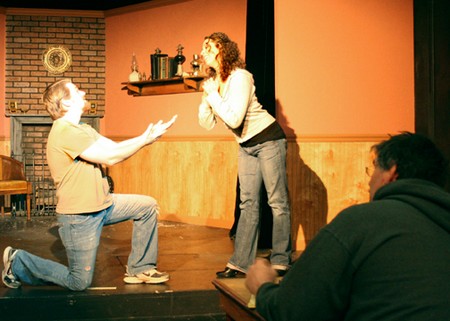The work needs an observer, who may be the director, acting teacher, or a fellow-actor who has common sense and can watch astutely. He or she will advise the actors on what emerged during improvisation with clarity, humanity and insight. You need to know several things before starting: where are we? What point of what situation have we reached? What relationship do the characters have to one another? And most important of all, what does my character wants? This is sometimes known as the ‘objective’ or ‘motivation’, and has two levels, what the character wants in the long-term, the life-plan, and what the character is trying to achieve immediately. These objectives are the mainspring of all character, and all acting. (Sometimes this ‘want’ can be very difficult to grasp: Christopher Hampton’s comedy The Philanthropist has a central character whose principal want is to agree with everybody and to lead a life devoid of emotional friction or involvement.)

Generally, the information given to the actors is spartan, and the objective of each character simple, that is, ‘what do I want now, at this moment?’ You might be one of a Pools syndicate who’ve just heard of a huge win, or a minority group in a despotic country who are facing exile or worse. Whatever the situation may be, the actor must feel free to speak or not, move or not, and must not make any attempt to ‘write’ a clever scene. There are many facile and shallow actors who can create reams of banal dialogue, and very good actors who are sparing with words. If you pursue your objective, something will happen, and the actor, as in life, may struggle for words or find them easily. The same must apply to emotion and feeling: let it happen from what occurs in the course of the improvisation, the pursuit of wants, the problems and difficulties that arise from the situation, the discoveries made about relationships. Other characters may have a completely different set of priorities.
The objective may change as the improvisation develops. If your objective is to cheer up a friend who is apparently unhappy, and he reveals that he has committed a serious crime, your response may veer from offering comfort and help on a superficial level to one of uncertainty: should you help? Can you help? His life and freedom are in the balance. Maybe the crime is so abhorrent that your objective becomes, ‘let me get out of here’. Maybe his crime is most shameful, and you find yourself reacting with prurient curiosity, or panic, covering your ears to block out his confession.
Improvisation is a garden where all aspects of human behavior and responses, may grow, and the painful or shameful inevitably arise. Only say what you mean, which may even take the form of a lie or dissimulation. Don’t ACT. If you do, the work will be stagey and false and you won’t get to a deeper understanding of truth and reality. (‘Truth’ and ‘reality’ are now almost clich¨¦s of pretentious actor-speak, but their depth and presence marks good acting from bad.) Believe in your objective, believe in the other characters, and let your emotions arise out of what happens between you, or from the situation itself. Through the frequent use of impro the actor learns to focus and select, to concentrate on what drives the character, and to contemplate his own resources of emotion, imagination, and access to sense and emotion memory. It reveals you to yourself, and points the way to areas of development and release: ‘I’m still very scared of being at a disadvantage’, I jump about and get overexcited by the idea’, ‘I do too much’ are the thoughts that can emerge. These are all pointers toward a necessary self-understanding- and the actor must think of himself with understanding and sympathy, in order to meet the challenge of difficulties, working for strength and flexibility in areas where he’s weak: a career in acting is one of continual adaptation.